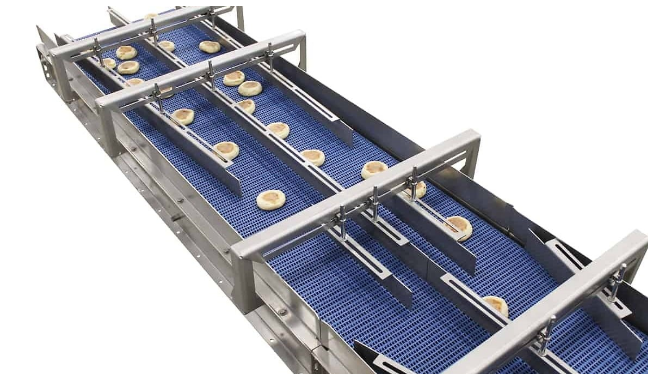In the fast-paced food industry, efficiency and safety are two critical elements that directly impact profitability and consumer trust. To meet these demands, many businesses rely on food conveyor systems to streamline operations. These specialized systems are designed to transport food products through different stages of processing, packaging, and distribution while maintaining high standards of hygiene. At Newtop Engineerings, we specialize in designing and implementing customized conveyor solutions that help businesses achieve greater productivity, reduce risks, and ensure compliance with strict food safety regulations.
What Are Food Conveyor Systems?
Food conveyor systems are mechanical handling solutions used in food manufacturing facilities to move raw ingredients, semi-processed items, and finished products from one stage of production to another. Unlike traditional conveyors used in other industries, these systems are built with food-grade materials, ensuring they meet strict hygiene requirements. Stainless steel, modular plastic belts, and easy-to-clean surfaces are commonly used to maintain safety standards.
From bakeries and meat processors to beverage plants and frozen food factories, conveyors provide reliable, automated movement of products, reducing manual labor and human error.
Why Food Conveyor Systems Are Essential in Food Processing
The food processing industry demands both speed and precision. Without automated conveyors, businesses risk inefficiencies, increased labor costs, and potential contamination. Below are the primary reasons why food manufacturers increasingly adopt conveyor technology:
- Increased Productivity
Automation ensures that products flow continuously without unnecessary downtime. High-volume production lines, especially in large food plants, can handle thousands of units per hour thanks to conveyors. - Improved Safety
Human handling of food products increases the risk of contamination. Conveyors minimize contact while meeting hygiene regulations. Additionally, safety features reduce workplace accidents. - Consistency and Quality
By automating movement, food processors ensure each product receives the same level of attention, reducing inconsistencies in quality. - Cost Efficiency
Though the initial investment may seem high, conveyors cut labor costs, reduce waste, and improve throughput, resulting in long-term savings.
Types of Food Conveyor Systems
Different applications require different conveyor designs. At Newtop Engineerings, we provide tailored systems that match your processing needs. Some common types include:
- Belt Conveyors: Ideal for moving loose food items like grains, snacks, or fruits. They offer smooth transfer and are easy to clean.
- Modular Plastic Belt Conveyors: Highly durable and resistant to corrosion, perfect for meat, poultry, and seafood industries.
- Incline Conveyors: Designed to transport products vertically or at angles, maximizing space utilization.
- Screw Conveyors: Commonly used for powders, grains, or semi-solid foods.
- Pneumatic Conveyors: Move powdered or granular products using air pressure, ensuring efficiency in dry food processing.
Each type is engineered to meet food safety requirements and withstand rigorous cleaning procedures.
Safety and Hygiene Considerations
Food safety is non-negotiable. Regulatory bodies enforce strict guidelines that food processors must follow to avoid contamination. This is where conveyor systems make a big difference:
- Hygienic Design: Smooth surfaces, stainless steel frames, and non-porous belts prevent bacterial growth.
- Easy Cleaning Access: Many conveyors are designed with quick-release belts and modular components for faster cleaning.
- Cross-Contamination Prevention: Automated movement reduces manual product handling, minimizing contamination risks.
- Compliance with Standards: Properly designed conveyors comply with FDA and HACCP standards, giving processors confidence in their safety measures.
At Newtop Engineerings, we design conveyors with cleanability and compliance in mind, helping businesses pass audits with ease.
How Food Conveyor Systems Enhance Productivity
Beyond hygiene and safety, the role of conveyors in productivity is undeniable. Here’s how:
- Continuous Workflow: Automated conveyors eliminate bottlenecks, ensuring smooth transitions between processing stages.
- Time-Saving: Instead of relying on manual workers to carry items, conveyors transport bulk loads quickly.
- Scalability: As production demand increases, conveyors can be modified or extended to handle higher volumes.
- Integration with Other Machines: Conveyors easily integrate with packaging, labeling, and inspection equipment, creating a seamless production line.
Choosing the Right Food Conveyor System
Not all food operations are the same. The right conveyor system depends on several factors:
- Type of Food Product: Liquids, powders, and solids require different designs.
- Production Volume: High-capacity lines may need heavy-duty conveyors.
- Available Space: Facility layouts dictate conveyor configurations.
- Hygiene Standards: Industries like dairy and meat processing demand the highest sanitation levels.
Newtop Engineerings works closely with clients to evaluate their operations and design customized conveyor solutions. Our team ensures each system maximizes output while maintaining strict compliance.
The Future of Food Conveyor Systems
With advancements in automation and digital technology, conveyors are becoming smarter. Features such as real-time monitoring, predictive maintenance, and integration with robotics are shaping the future of food processing. Conveyor systems are no longer just about moving products—they’re about ensuring smarter, safer, and more efficient operations.
Why Partner with Newtop Engineerings?
Newtop Engineerings is dedicated to delivering cutting-edge food conveyor systems tailored to your business needs. Our focus on innovation, safety, and customer satisfaction makes us a trusted partner in the food processing industry. Whether you operate a small production unit or a large-scale facility, we provide durable, hygienic, and efficient conveyor solutions that drive long-term success.
Conclusion
Food conveyor systems are more than just equipment; they are essential investments that improve productivity, safety, and quality in food processing. By reducing manual labor, preventing contamination, and streamlining production lines, they empower food businesses to meet increasing demands while staying compliant with safety regulations

